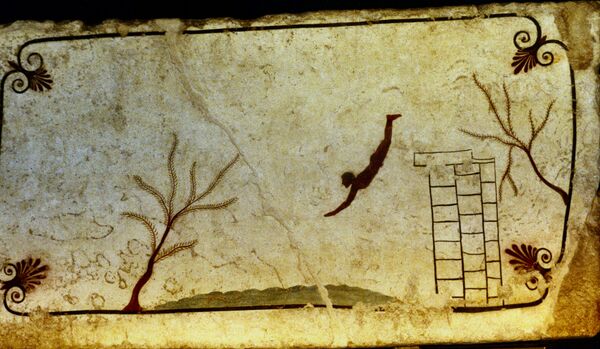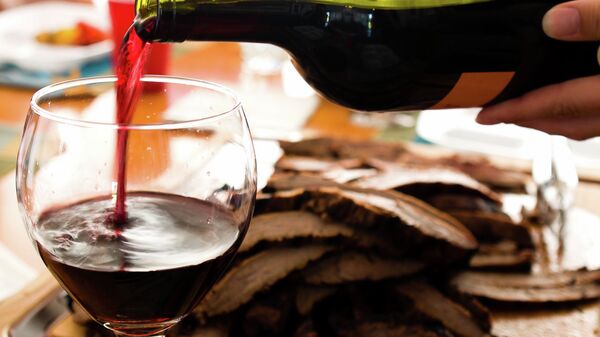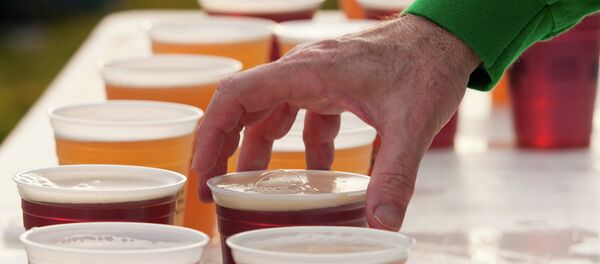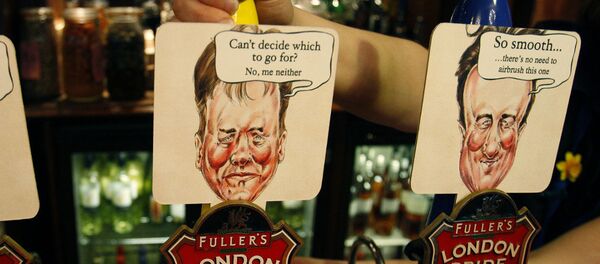While the ancients may have been busy birthing modern civilization, those Greeks and Romans could throw down as well as anyone. So as long as they were inventing things like democracy, the ancients figured they may as well concoct a few hangover cures on the side. Thanks to Raw Story, you too can start the New Year right.
The trick? Keep your body heat down, and here’s how.
1. Dilution, dilution, dilution
One means of prevention was to water down the wine.

"The vine bears three kinds of grapes," Anacharsis wrote in the sixth century BCE, according to Raw Story, "the first of pleasure, the next of intoxication, and the third of disgust."
Dilution supposedly allows the drinker to savor the pleasure grape, while heading off the nasty effects of the other two.
All well and good if you plan on drinking boxed wine from Harris Teeter on Thursday night. But please don’t pour any water into a bottle of 40-year-old Scotch.
2. Red Wine You’re On the Floor, White Wine Have Some More
Doctors didn’t exactly have the best understanding of the human body 2,000 years ago. As such, the ancients believed that blood was created by digested food and drink. Too much blood means your body is too warm.
Of course, some foods produced more blood than others. Red wine was considered especially potent since it bears a physical resemblance to blood, so white wine was believed to be a safer potable to drink in excess. One can imagine the ancients would have had the same aversion to cherry Kool-Aid.
3. Non-Stinky Flowers
Wearing a protective wreath of ivy or flowers around your head while drinking will help keep your cranium cool, according to ancient physicians. Roses are the preferred varieties, but really any petals will do so long as they’re not too aromatic. Lilies, for example, have too strong a scent to effectively…cool the head.
Drunkenly falling into a crepe myrtle probably doesn’t count.
4. Too Much of a Good Thing? Drink a Bad Thing
If, at this point, you’ve already had so much merlot that you’re in danger of becoming a walking blood pack, good news! You can counteract the effects of the wine’s transformation by downing a few gulps of vinegar.
According to the ancients, your body will reject the unholy combination of good wine and sour wine brewing in your belly and force you to hurl the whole, disgusting concoction out into the bush you just fell in.
They also recommend sprinkling some flowers into the vinegar, just because.
5. A Handful of Almonds
In the first century CE, Dioscorides wrote that one should consume five almonds before drinking to prevent drunkenness. Little explanation is given, but it’s better than vinegar, right? An Almond Joy bar probably works just as well.
6. Consume Wine’s Mortal Enemy – Cabbage
The Greeks invented all manner of rivalries between the Gods and Goddesses. But they also created lesser-known conflicts between foods that grew in their gardens. There wasn’t a lot to do before TV.
In this case, grapevines were thought to despise the pungent odor of any vegetable belonging to the cabbage family, so much so that planting vines near cabbage sprouts was thought to affect the vine’s growth.
Naturally, the same concept can be applied to wine. Cabernet hates vinegar, but it really hates leafy vegetables. If you don’t have any almonds handy, down a few Brussel sprouts for good measure.
7. James Joyce
If one of your New Year’s resolutions is to read more, you’re in luck: that’s a hangover cure. Vandanius Anatolius of Beirut wrote in the 4th century CE that focusing on intellectual pursuits would make it impossible to notice that throbbing headache.
When better to finally pick up that copy of Ulysses than 9 AM on New Year’s Day? If you can make it through three pages without promising to never drink again, you’ve earned yourself a beer.




